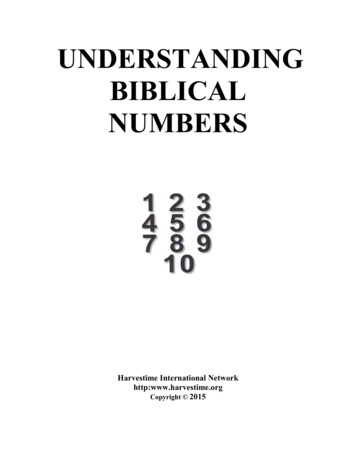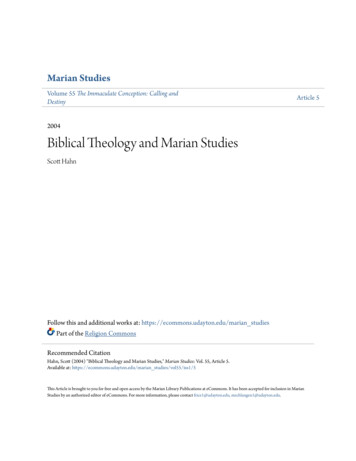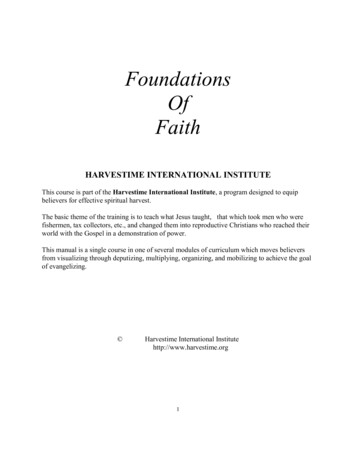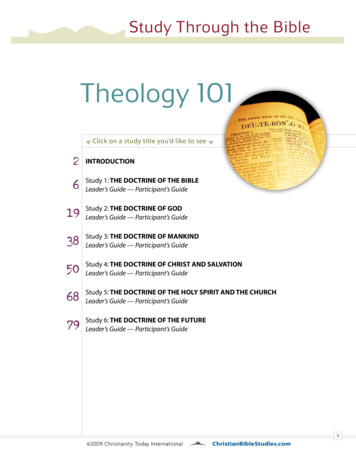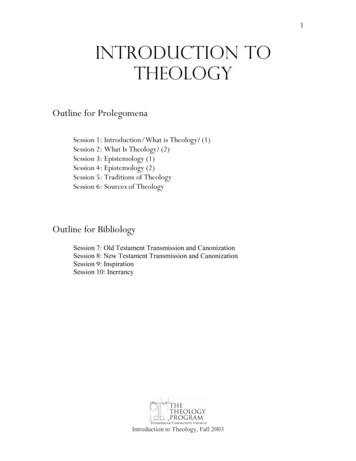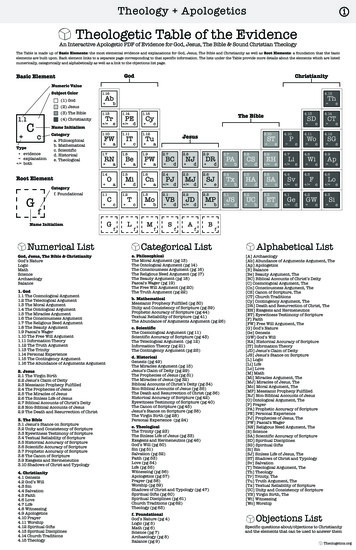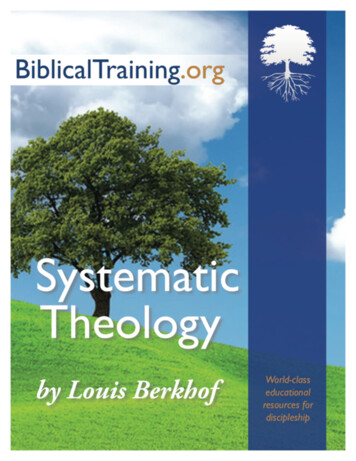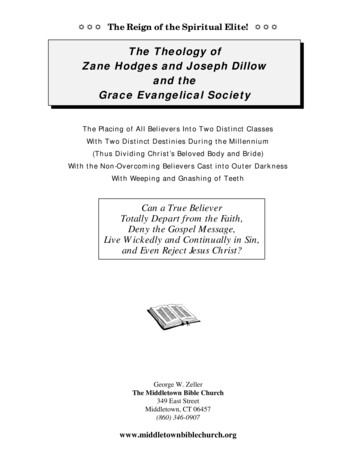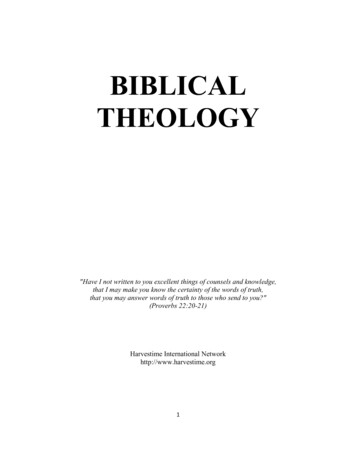
Transcription
BIBLICALTHEOLOGY"Have I not written to you excellent things of counsels and knowledge,that I may make you know the certainty of the words of truth,that you may answer words of truth to those who send to you?"(Proverbs 22:20-21)Harvestime International Networkhttp://www.harvestime.org1
TABLE OF CONTENTSPageAn Introduction To Theology3Chapter One: Paterology: God The Father6Chapter Two: Christology: Jesus Christ27Chapter Three: Pneumatology: Holy Spirit59Chapter Four: Angelology: Angels91Chapter Five: Demonology: Satan And Demonsl05Chapter Six: Bibliology: The Bible121Chapter Seven: Harmartiology: Sin144Chapter Eight: Soteriology: Salvation157Chapter Nine: Ecclesiology: The Church171Chapter Ten: Eschatology: Prophecy, The End-times, Eternity185Epilogue198Answers To Self-Tests1992
AN INTRODUCTION TO THEOLOGYTHE DEFINITION OF THEOLOGYThe word "theology" comes from two Greek words, theos meaning "God" and logos meaning"the word about" or "the study of" God as He is revealed in the Scriptures. Simply defined,theology is an in-depth study of the Holy Bible to discover what God has said about Himself, Hispurposes, His plans, and His promises.THE SUBJECTS OF THEOLOGYThe major subjects of theology includes the study of:-Paterology: The study of God, the Father.-Christology: The study of the Son, Jesus Christ.-Pneumatology: The study of the Holy Spirit.-Angelology: The study of angels.-Demonology: The study of Satan and demons.-Bibliology: The study of the Holy Bible, which is the revelation of God.-Harmartiology: The study of sin.-Soteriology: The study of salvation which is God's provision for sin.-Ecclesiology: The study of the Church.-Eschatology: The study of biblical prophecy, the end-times, and eternity.These words are not used in the Bible, but are terms used by scholars to describe the majorsubjects of theology. Entire volumes have been written on each of these subjects--a book couldeasily be written on each topic. The purpose of this study, however, is to provide a summary forindependent learning and/or teaching of basic theological concepts. It uses the Scriptures as theprimary resource, and does not deal with conflicting theological arguments.THE CENTRAL THEMEThe Bible reveals the mystery of God’s plan which is the unifying theme of the Bible. It is therevelation of Jesus Christ as the Savior of sinful mankind. Jesus explained how the OldTestament centered on Him: "And He said unto them, These are the words which I spake untoyou while I was yet with you, that all things must be fulfilled, which were written in the law ofMoses, and in the prophets, and in the psalms concerning me" (Luke 24:44). With thisintroduction, Jesus continued and ".opened He their understanding that they might understandthe scriptures" (Luke 24:45). What was the key Jesus gave them to understanding theScriptures? The fact that its major theme focused on Him: ".Thus it is written, and thus itbehooved Christ to suffer, and to rise from the dead the third day: And that repentance andremission of sins should be preached in His name among all nations, beginning at Jerusalem.And Ye are witnesses of these things" (Luke 24:46-48).3
The Old and New Testaments both tell the story of Jesus. The Old Testament prepares us for Hiscoming and the New Testament tells how it happened. This unites the entire Bible and the studyof Biblical theology in one major theme: Jesus Christ.THE IMPORTANCE OF THEOLOGYThere are several important reasons for studying and understanding the major teachings ofScripture.-Theology is important for personal spiritual growth and development so that you may".grow in grace, and in the knowledge of our Lord and Saviour Jesus Christ" (2 Peter3:18). Growth takes time in the natural world as well as the spiritual world. Sometheological truths can only be understood over a period of time. For example, if you are anew believer, you may not understand the faithfulness of God as well as someone whohas served the Lord for years.-Theology is important in order to avoid doctrinal error. The first sin resulted from theenemy questioning ".Has God said?" (Genesis 3:1). If you do not know what God hassaid in His Word regarding foundational issues of faith, then you may fall into doctrinalerror and--ultimately--into sin.-Theology is vital in order to be able to explain Biblical truths to unbelievers and beprepared to give an answer for the hope which is within you (1 Peter 3:15).-Theology is essential for your spiritual walk and ministry. As in all Bible study, youshould seek heart knowledge--not just head knowledge--through application of what youlearn. The purpose of revelation is not just to obtain information, but to allow revelationto result in application to and transformation of your life.HOW TO USE THIS STUDYYou may choose to study or teach the entire course on Biblical Theology or you can selectindividual topics and focus on a single subject. To receive the full benefits of this study:-Theology must be approached with a spiritual mind because ".the natural man receiveth notthe things of the Spirit of God: for they are foolishness unto him: neither can he know them,because they are spiritually discerned" (1 Corinthians 2:14). A spiritual mind is one that hasbeen transformed by the new birth experience and is immersed in and consumed by a passion forGod and His Word.-All verses referenced in the manual should be read and studied.-Additional Harvestime International Network materials that relate specifically to the theologicalsubjects discussed in this study will be mentioned where applicable and should be consulted.4
SELF-TEST1.Define theology.2.Define Paterology.3.Define Christology.4.Define Pneumatology.5.Define Angelology.6.Define Demonology.7.Define Bibliology.8.Define Harmartiology.9.Define Soteriology.10.Define Ecclesiology.11.Define Eschatology.12.Upon whom does the subject of the Bible and Biblical theology focus?13.List four reasons why it is important to study theology.(Answers to tests are provided at the conclusion of the final chapter in this manual.)5
CHAPTER ONEPATEROLOGYGod The FatherDEFINITIONPaterology comes from two Greek words which mean "father" and "word". When combined andused in terms of theology, they mean "the study of the Father". Common subjects studied inPaterology include the knowledge of the existence of God, the Trinity of God, the attributes ofGod, the names of God, His sovereignty, and His purposes and plans.THE KNOWLEDGE OF THE EXISTENCE GODWe obtain knowledge of God in the following ways:-From Creation.The first words in Genesis are: "In the beginning God created." Genesis chapters 1-3 recordthat God is the creator. If you do not believe these first five words, then you will be unable tounderstand or accept the remaining truths of biblical theology. God created both the natural andspiritual worlds.Here are some other verses confirming God as Creator:O Lord of hosts, God of Israel, enthroned above the cherubim, you are the God, youalone, of all the kingdoms of the earth; you have made heaven and earth. (Isaiah 37:16)Ah, Lord God! It is you who have made the heavens and the earth by your great powerand by your outstretched arm! Nothing is too hard for you. (Jeremiah 32:17)In the beginning was the Word, and the Word was with God, and the Word was God. Hewas in the beginning with God. All things were made through him, and without him wasnot any thing made that was made. (John 1:1-3)For by him all things were created, in heaven and on earth, visible and invisible,whether thrones or dominions or rulers or authorities—all things were created throughhim and for him. (Colossians 1:16)God created everything--the universe, the earth, plants, animals, water, light, seasons, etc. Hisgreatest creation was man who was made in His image.6
All creation continues to be sustained by God:He waters the mountains from His upper chambers; The earth is satisfied with the fruit ofHis works. He causes the grass to grow for the cattle, And vegetation for the labor ofman, So that he may bring forth food from the earth, (Psalm 104:13-14)He is before all things, and in Him all things hold together. (Colossians 1:17)And He is the radiance of His glory and the exact representation of His nature, andupholds all things by the word of His power When He had made purification of sins, Hesat down at the right hand of the Majesty on high. (Hebrews 1:3)Creation actually declares and confirms the existence of God:The heavens declare the glory of God; and the firmament sheweth his handywork. Dayunto day uttereth speech, and night unto night sheweth knowledge. There is no speechnor language, where their voice is not heard. (Psalm 19:1-3)The heavens declare his righteousness, and all the people see his glory. (Psalm 97:6)For the invisible things of him from the creation of the world are clearly seen, beingunderstood by the things that are made, even his eternal power and Godhead; so thatthey are without excuse. (Romans 1:20)-From History.History confirms the existence of Jesus Christ, the Son of God--His birth, ministry, death, andresurrection. Historical records of kings, wars, and other events in the Bible are also confirmedby history. Archeological digs have also confirmed many cities, villages, and events mentionedin the Bible.-From Tradition.Accurate knowledge of God is passed from one generation to the next.-From Experience.Through the new birth experience, people come to a knowledge of the living God. Experiencessuch as dreams and visions may also provide knowledge of the true God, as do experiences ofobserving God at work in the lives of others in miracles and transformation.-From Revelation.The greatest confirmation of the existence of God is found in the Word of God throughnumerous statements such as these:7
I am God, even thy God.(Psalm 50:7)Look unto me, and be ye saved, all the ends of the earth: for I am God , and there is noneelse. (Isaiah 45:22).I am God, and there is none else; I am God, and there is none like me. (Isaiah 46:9)THE TRINITY OF GODThe one true God is revealed in three distinct personalities of the Father, the Son Jesus Christ,and the Holy Spirit. They are one in essence, one God with three distinct natures. The doctrineof the Trinity must be accepted by faith, as it is difficult to grasp with our finite minds.The first person of the Trinity of God is called the Father. He is the father of:-Israel: Exodus 4:22-The angels: Job 38:7-Jesus Christ: John 17:1-All believers: John 1:12-13In the Old Testament, the Hebrew word for God, "Elohim", is a plural word. Plural pronouns areused of God (Genesis 1:26), and the angel of Jehovah is deemed to be Old Testamentappearances of Christ (Judges 2:1-5). The strongest Old Testament verse for the doctrine of theTrinity is:Come ye near unto me, hear ye this; I have not spoken in secret from the beginning; fromthe time that it was, there am I: and now the Lord God, and his Spirit, hath sent me.(Isaiah 48:16)In the New Testament, the Father, Son and Spirit are confirmed to be divine, to do the works ofGod, and to be worshipped. Much is written about the deity of Jesus (examples in John 1:1;Titus 2:13), yet He is distinguished from the Father and the Spirit. The Spirit is also God(Matthew 28:19-20; Acts 5:3-5), but distinguished from the Father and the Son.God has a triune nature with three distinct personalities, yet He is one God:Hear, O Israel: The Lord our God is one Lord. (Deuteronomy 6:4)There are several Scriptures which confirm this triune nature of God. When Jesus was beingbaptized by John the Baptist in the Jordan River, God spoke and the Holy Spirit descended:And Jesus, when He was baptized, went up straightway out of the water: and, lo, theheavens were opened unto Him, and He saw the Spirit of God descending like adove, and lighting upon Him: And lo, a voice from Heaven saying, This is my belovedSon, in whom I am well pleased. (Matthew 3:16-17)8
Prior to returning to Heaven after His ministry on earth, Jesus spoke of the Holy Spirit comingfrom God:But when the Comforter is come, whom I will send unto you from the Father, even theSpirit of truth, which proceedeth from the Father, He shall testify of me.(John 15:26)The Apostle Peter spoke of the triune nature of God:If ye be reproached for the name of Christ, happy are ye; for the Spirit of glory and ofGod resteth upon you: on their part He is evil spoken of, but on your part He is glorified.(1 Peter 4:14)The Apostle Paul spoke of the Trinity in his writings:For the law of the Spirit of life in Christ Jesus hath made me free from the law of sin anddeath. For what the law could not do, in that it was weak through the flesh, God sendingHis own Son, in the likeness of sinful flesh, and for sin, condemned sin in the flesh.(Romans 8:2-3)The grace of the Lord Jesus Christ, and the love of God, and the communion of theHoly Ghost, be with you all. (2 Corinthians 13:14)For through Him (the Son) we both have access by one Spirit unto the Father.(Ephesians 2:18)The book of Acts also verifies the triune nature of God:Therefore being by the right hand of God exalted, and having received of the Father thepromise of the Holy Ghost, He (Jesus) hath shed forth this, which ye now see and hear.(Acts 2:33)THE ATTRIBUTES OF GODGod the Father, Jesus Christ, and the Holy Spirit are described in the Bible in terms of theirnature. When we speak of "nature" we mean basic qualities which describe God. These qualitiesare also known as "attributes" which means "characteristics." The Bible reveals that God is.Eternal.The Trinity of God is eternal with no beginning and no ending:Lord, Thou hast been our dwelling place in all generations. Before the mountains werebrought forth, or ever Thou hadst formed the earth and the world, even from everlastingto everlasting, Thou art God. (Psalms 90:1-2)And Abraham planted a grove in Beersheba, and called there on the name of the9
Lord, the everlasting God. (Genesis 21:33)The eternal nature of God can be illustrated by a circle. The circle has no visible starting point orending point, yet it exists.A Spirit.God is a spirit. This means He is without flesh and blood and therefore invisible to the naturaleyes of man:God is a Spirit: and they that worship Him must worship Him in spirit and in truth.(John 4:24)Sovereign.God is sovereign--the ruling power over all the universe. Read Ephesians l and Romans 9.Omnipresent.God is present everywhere:For the eyes of the Lord run to and fro throughout the whole earth. (2 Chronicles 16:9)The eyes of the Lord are in every place, beholding the evil and the good. (Proverbs 15:3)Whither shall I go from Thy Spirit? Or whither shall I flee from Thy presence? If Iascend up into Heaven, Thou art there: if I make my bed in Hell, behold, Thou arethere. (Psalms 139:7-8)Omniscient.God knows all things:.Thou knowest it altogether. (Psalms 139:4).God is greater than our heart, and knoweth all things. (1 John 3:20).But all things are naked and opened unto the eyes of Him with whom we have to do.(Hebrews 4:13)Omnipotent.God is all powerful:.I am the Almighty God. (Genesis 17:1)10
.With God all things are possible. (Matthew 19:26).For the Lord God omnipotent reigneth. (Revelation 19:6)God hath spoken once; twice have I heard this; that power belongeth unto God.(Psalms 62:11)Unchanging.God does not change His person, nature, or divine purposes:For I am the Lord, I change not. (Malachi 3:6)Jesus Christ the same yesterday, to day, and for ever. (Hebrews 13:8)Holy/righteous.God is sinless, absolutely pure:.Ye shall be holy: for I the Lord your God am holy. (Leviticus 19:2)Just.God is fair and impartial in judgment:.A God of truth and without iniquity, just and right is He. (Deuteronomy 32:4)Faithful.God keeps His promises and is absolutely trustworthy.He abideth faithful: He cannot deny Himself. (2 Timothy 2:13)Benevolent.God is good, kind, and desires your welfare. He is benevolent towards all of His creatures:The Lord is good to all: and His tender mercies are over all His works. (Psalms 145:9)Merciful.God shows continuous mercy to sinful mankind:.The Lord God, merciful and gracious, long suffering, and abundant in goodness andtruth. Keeping mercy for thousands. (Exodus 34:6-7)11
Gracious.God shows undeserved kindness to sinful man:.For I am gracious. (Exodus 22:27)The Lord is gracious, and full of compassion; slow to anger, and of great mercy.(Psalms 145:8)Loving.God is love:He that loveth not knoweth not God; for God is love. (1 John 4:8)Longsuffering.God "suffers long"--meaning that He does not immediately judge sin, but appeals to all men torepent and patiently waits for them to acknowledge their sins and turn to Him.Wise.God shows deep understanding and keen discernment.The Lord by wisdom hath founded the earth; by understanding hath He established theheavens. (Proverbs 3:19)Infinite.God is not subject to natural and human limitations. He is not subject to the limitations of space:But will God indeed dwell on the earth? behold, the heaven and heaven of heavenscannot contain thee: how much less this house that I have builded? (1 Kings 8:27)He is not subject to the limitations of time:The Lord shall reign for ever and ever. (Exodus 15:18)See also 1 Kings 8:27; Exodus 15:18; Deuteronomy 33:27; Nehemiah 9:5; Psalms 90:2;Jeremiah 10:10; and Revelation 4:8-10.NAMES OF GODGod has revealed himself in many ways in the Holy Bible, including His names through whichHe has revealed His nature and character. The word "God" (one who is worshiped) is a title12
men use to describe the Supreme Being. In the Bible names are more than an identification.They are descriptive of the bearer of the name. The names for God i:-El:-El Shaddai:-Elolam:-El Elyon:Means Lord."The Lord that healeth": Exodus 15:26"The Lord our banner": Exodus 17:8-15"The Lord our peace": Judges 6:24"The Lord my shepherd": Psalms 23:1"The Lord our righteousness": Jeremiah 23:6"The Lord who provides": Genesis 22:14"The Lord is there": Ezekiel 48:35Means God and is used where the creative power of God is implied:Acts 17:28; John 1:12-13Abba--Heavenly Father: Romans 8:15Means Lord or Master: Exodus 23:17; Isaiah 10:16,33This is often used in combination with other words for God:"The God who is sufficient for the needs of His people": Exodus 6:3"The everlasting God": Genesis 21:33"Most high God, exalted above all other gods": Genesis 14:18-20THE SOVEREIGNTY OF GODThe best statement of the sovereign plan of God is the summary in the Westminster ShorterCatechism: “The decrees of God are His eternal purpose, according to the counsel of His will,whereby, for His own glory, He hath foreordained whatsoever comes to pass.”The details of the plan of God are revealed clearly in Romans 9 and Ephesians 1:11: “.in whomwe also were called, having been foreordained according to the plan of him who works out allthings in conformity with the counsel of his will.”These decrees of God are to be distinguished from God’s will in regards to His commands andprohibitions which are clearly laid out in His Word. For example, the fall of man--whichresulted from the command to “not to eat the fruit”--was foreknown by God, but He is not theauthor of sin in any way. Mankind has free will and is responsible for their choices. Thecommand of God was not to eat the fruit, yet He knew that man would eat the fruit.Jesus taught that His death was not an accident, but rather according to the foreordained anddecreed plan of God (Luke 22:22). Peter states regarding the crucifixion that Jesus was handedover to the people by “God’s set purpose and foreknowledge”. Yet in neither of these cases arethe sins of these people or the moral and spiritual consequences minimized. People areresponsible for their choices, even though those choices were foreknown by God.Jesus said “woe” to the person who betrayed Him and Peter referred to the men as “wicked” whocrucified Him (Acts 2:22-24). The early Church implicated Herod, Pontius Pilate, the Jews, and13
Gentiles in this awful deed, claiming that they had done what “God’s hand and will determinedbeforehand should happen”. Again, this confirms that God knows the future because He decreedwhat would come to pass.We are predestined in one sense, in that all mankind is predisposed to sin because of the basic sinnature:Wherefore, as by one man sin entered into the world, and death by sin; and so deathpassed upon all men, for that all have sinned. (Romans 5:12)According to Romans 8:29, however, God's predetermined plan is that we all be conformed tothe image of His Son through salvation and the new birth experience: ".For whom he didforeknow, he also did predestinate to be conformed to the image of his Son." A sovereign Godknows who will chose His plan, and who will reject it--yet without violating man's free will.God is sovereign over all the world:-He controls the physical universe: Matthew 5:45; Acts 14:17.-He controls animals: Psalm 147:9; Matthew 6:26.-He controls nations: Daniel 2:38-39; 4:17,25; Romans 13:1.-He controls individuals: Galatians 1:15-16; Luke 1:52; Philippians 4:19; Matthew 10:30.-He controls the destiny of the wicked: Psalm 11:6.THE PURPOSES OF GODGod's purpose is not a vague purpose or a "hoped for" purpose. The purpose of God is clearlycommunicated in His Word. Perhaps one of the best summaries of His purpose is given in thebook of Ephesians. Here is God's statement of purpose:According to the eternal purpose which He purposed in Christ Jesus our Lord.Havingmade known unto us the mystery of His will, according to His good pleasure which Hehath purposed in Himself; That in the dispensation of the fullness of times, He mightgather together in one all things in Christ, both which are in Heaven, and which are onearth, even in Him. (Ephesians 3:11;1:9-10)God wants to bring all men into right spiritual relationship with Himself:The Lord is not slack concerning His promise, as some men count slackness; but islongsuffering to us-ward, not willing that any should perish, but that all should come torepentance. (2 Peter 3:9)God's purpose is that all people experience forgiveness of sins through Jesus Christ, come intoright relationship with Him, and become part of the Kingdom of God (John 3). The Bibleassures that God's purposes will be accomplished:14
The Lord of hosts hath sworn, saying, Surely as I have thought, so shall it come to pass;and as I have purposed, so shall it stand. (Isaiah 14:24)This is the purpose that is purposed upon the whole earth: and this is the hand that isstretched out upon all the nations. For the Lord of hosts hath purposed and who shalldisannul it? and his hand is stretched out, and who shall turn it back? (Isaiah 14:26-27)THE PLANS OF GODGod not only has an established purpose, He implements plans to achieve that purpose. God usesindividuals, nations, Jesus, the Holy Spirit, and the Church to accomplish His plans.Individuals.From the beginning of time as we now know it, God has worked through individuals toaccomplish His purposes. The Bible is filled with stories of how God used different men andwomen as part of His plan.In Old Testament times God raised up great leaders like Noah, Abraham, Joseph, and Moses. Healso anointed prophets, kings, and judges to accomplish His purposes. In New Testament times,God used individuals like John the Baptist, the disciples of Jesus, Paul, Timothy, Barnabas andmany others.God even took sinful men who would not conform to His plan and reversed their evil plans toaccomplish His purposes. God did not cause their sinful actions, but He worked through themand in spite of them to achieve His will. For example, God said regarding the wicked Pharaoh inEgypt:And in very deed for this cause have I raised thee up, for to shew in thee my power; andthat my name may be declared throughout all the earth. (Exodus 9:16)Nations.In Old Testament times God raised up the nation of Israel to accomplish His purpose in theworld. As a nation, Israel was mandated to reveal God's plan to the heathen nations of the world.Repeatedly, they failed in this responsibility.Because of this, judgment came upon Israel through the heathen nations which lived aroundthem. God was so determined to accomplish His plan that He worked through the evil acts ofthese sinful nations, although He did not condone their actions and held them accountable.15
Jesus Christ.Early in history, God promised a Savior through whom forgiveness from sin would be availableto all mankind. The promise was first given to Adam and Eve after their sin in the Garden ofEden. God said:And I will put enmity between thee and the woman, and between thy seed and her seed; itshall bruise thy head, and thou shalt bruise his heel. (Genesis 3:15)This was the beginning of many promises of a Savior. For a long time God did not reveal thedetails of how He would accomplish this plan. It was a great mystery. Later, in the time of theOld Testament prophets, God shared additional details of His plan. In New Testament times,these details were fulfilled and the mystery revealed when God sent His only Son, the Lord JesusChrist, to die for the sins of all mankind:No longer was God's plan a mystery. His plans and purpose were revealed openly inJesus Christ: Having made known unto us the mystery of His will, according to His goodpleasure which He hath purposed in Himself; That in the dispensation of the fullness oftimes, He might gather together in one all things in Christ, both which are in Heaven,and which are on earth, even in Him. (Ephesians 1:9-10)From childhood, Jesus knew God's purpose was to provide salvation for all mankind and restoreall men and nations into fellowship with Him. Jesus lived His life on earth to accomplish God'spurposes. Even as a child, Jesus was concerned--not with His own plans and purposes--but withthose of God the Father. When His parents thought He was lost and eventually found Him.He said unto them, How is it that ye sought me? wist ye not that I must be about myFather's business? (Luke 2:49)The ministry of Jesus focused on the purposes of God. Every plan, every decision, and every actfocused on these purposes:The Spirit of the Lord is upon me, because He hath anointed me to preach the Gospelto the poor, He hath sent me to heal the brokenhearted, to preach deliverance to thecaptives, and recovering of sight to the blind, to set at liberty them that are bruised. Topreach the acceptable year of the Lord. (Luke 4:18-19)Jesus commissioned His followers, which includes all true believers, to fulfill God's purposes:Go ye therefore and teach all nations, baptizing them in the name of the Father, and ofthe Son, and of the Holy Ghost; Teaching them to observe all things whatsoever I havecommanded you; and lo, I am with you alway, even unto the end of the world.(Matthew 28:19-20)The chapter on Christology in this study provides details on the ministry of Jesus.16
The Holy Spirit.The Holy Spirit is also part of God's plan. After Jesus returned to Heaven, a special power wasgiven in an outpouring of the Holy Spirit described in Acts 2. This experience is called thebaptism of the Holy Spirit. The power of the Holy Spirit was given to accomplish God'spurposes in the world:But yet shall receive power, after that the Holy Ghost is come upon you: and ye shall bewitnesses unto me both in Jerusalem, and in all Judaea, and in Samaria, and unto theuttermost part of the earth. (Acts 1:8)The Holy Spirit provides guidance and direction to believers to enable them to fulfill God'splans. Because the Holy Spirit knows the will of God, and because He searches and understandsthe spirit of man, He serves as the link between you and God to help you achieve these purposes:And he that searcheth the hearts knoweth what is the mind of the Spirit, because hemaketh intercession for the saints according to the will of God. (Romans 8:27)The Holy Spirit works in partnership with you to accomplish God's will. As you speak God'sWords, He convicts unbelievers of sin, leading them to accept the Gospel (John 16:7-11). Thechapter on Pneumatology in this course provides additional teaching on the Holy Spirit.The Church.All true believers are part of the Church, which is now the instrument through which God worksto accomplish His purpose and plans on earth:And to make all men see what is the fellowship of the mystery, which from the beginningof the world hath been hid in God, who created all things by Jesus Christ: To the intent[this means it is God's purpose] that now unto the principalities and powers in heavenlyplaces might be known by the church the manifold wisdom of God [God's plan andpurpose]. (Ephesians 3:9-10, TAB)God works in the lives of believers who are members of the Church to accomplish His purposes:For it is God which worketh in you both to will and to do His good pleasure.(Philippians 2:13)To "do His good pleasure" means He is working in you to accomplish His purposes in your life.This includes salvation, infilling of the Holy Spirit, using you to minister to others, andcontinuously conforming you to the image of His Son, Jesus Christ:Neither yield ye your members as instruments of unrighteousness unto sin: but yieldyourselves unto God, as those that are alive from the dead, and your members asinstruments of righteousness unto God. (Romans 6:13)17
When you yield yourself to become "instruments of righteousness unto God" it means you bringyour life and ministry in harmony with His purpose and plans. By doing this, you becomeinstruments through which He can work:Now then, we are ambassadors for Christ. (2 Corinthians 5:20)We then, as workers together with Him. (2 Corinthians 6:1)If God does not work in and through you, then all of your work is in vain:Except the Lord build the house,
The Bible reveals the mystery of God’s plan which is the unifying theme of the Bible. It is the revelation of Jesus Christ as the Savior of sinful mankind. Jesus explained how the Old Testament centered on Him: "And
